[It’s okay to mourn- 2012 was a long time ago, and we’re well into 2013, which is not the year that 2012 was. Indeed, 2012 was the best year for pop culture in a long time- at least since 2009. There wasn’t a runaway favorite in the music scene like Adele’s 21 in 2011, but that’s because there were so many great offerings from 2012. There wasn’t a clear favorite in Hollywood like…well, there wasn’t a clear favorite in 2011 either, was there? But that was for lack of quality, whereas in 2012 we were inundated with quality movies the entire year. Ah, the good old days. Excuse me while I take out my teeth and reach for my prune juice.
2012 was a banner year, and what better time to look back at it than 9 months later? No, seriously. You don’t think so? That’s okay. Honestly, if I could, I’d do these Bummys lists right at the beginning of the year, but when January rolls around, I still have so many movies to watch and so much music to listen to, I can’t make a year-end list. So I have to settle for what in our culture of immediacy amounts to a retrospective, akin to those montages at the Oscars for the celebrities that passed away that year. We look back in fondness on the historic year of 2012; may the entire cast of Cloud Atlas rest in peace.]
Interestingly, I’ve already done a Top 10 Albums of 2012 list, at the end of the year, in conjunction with my friend’s blog. Also interesting: four albums that made an appearance on that list don’t show up on this one. I guess my perspective changed a little bit. Two folk albums, the Vespers’ The Fourth Wall and Carolina Chocolate Drops’ Leaving Eden, were replaced by a rap album and a Christian electronic album, something I definitely didn’t expect. Trip Lee fell to the “Fifteen More” category. And Alabama Shakes, my beloved Alabama Shakes, were replaced by a brother duo from Texas that no one’s heard of. I’m not sure what I was thinking, but I’m sure of one thing: this is the right list.
Top Albums of 2012
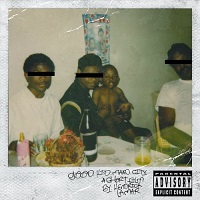 10. Kendrick Lamar, good kid, m.A.A.d city: A lot of albums profess to be concept albums, LPs with a plot and characters, but the majority end up having the vague outline of a story rather than the concrete and significant details that add weight to a narrative (see: American Idiot and The Black Parade, both great albums, but not great concept albums). Kendrick Lamar’s good kid, m.A.A.d city might be the most fully fleshed-out concept album I’ve ever heard. It helps that Lamar’s focus on his concept album is more specific than most; good kid is a chronicle of one evening in Lamar’s life out on the streets with his friends while they cruise around in his parents’ van. From this one evening comes a treasure trove of insight about his lack of pleasure in his hedonistic but monotonous lifestyle (“Swimming Pools (Drank)”), his neverending search for escape (“B*tch, Don’t Kill My Vibe”), and his dependence on his rapping for fulfillment (“Poetic Justice”). But the overall takeaways from good kid are Lamar’s incredible self-awareness as he quotes Scripture and prayers in the midst of his own sinfulness, as well as the cyclical culture of the streets, mirrored in the way the record ends right where it began, implying that the sin and tragedy Kendrick places before us is only going to keep going.
10. Kendrick Lamar, good kid, m.A.A.d city: A lot of albums profess to be concept albums, LPs with a plot and characters, but the majority end up having the vague outline of a story rather than the concrete and significant details that add weight to a narrative (see: American Idiot and The Black Parade, both great albums, but not great concept albums). Kendrick Lamar’s good kid, m.A.A.d city might be the most fully fleshed-out concept album I’ve ever heard. It helps that Lamar’s focus on his concept album is more specific than most; good kid is a chronicle of one evening in Lamar’s life out on the streets with his friends while they cruise around in his parents’ van. From this one evening comes a treasure trove of insight about his lack of pleasure in his hedonistic but monotonous lifestyle (“Swimming Pools (Drank)”), his neverending search for escape (“B*tch, Don’t Kill My Vibe”), and his dependence on his rapping for fulfillment (“Poetic Justice”). But the overall takeaways from good kid are Lamar’s incredible self-awareness as he quotes Scripture and prayers in the midst of his own sinfulness, as well as the cyclical culture of the streets, mirrored in the way the record ends right where it began, implying that the sin and tragedy Kendrick places before us is only going to keep going.
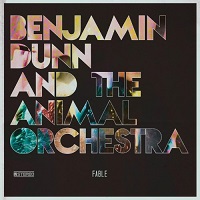 9. Benjamin Dunn & the Animal Orchestra, Fable: If you had given up on Christian music before 2012 (and who could blame you, really…), you picked a terrible time to do it. Independent Christian music is on the rise, with the help of Derek Webb’s NoiseTrade website, which coincidentally just released an offer for Benjamin Dunn’s discography for free (the offer’s over, btw- it was only a week; sorry, you snooze, you lose). Benjamin Dunn synthesizes rock and electronic music into a wildly satisfying blend of happiness. The music would induce rapture on its own, but Dunn has paired it with a libretto that draws inspiration from C.S. Lewis’s Narnia books both in its characters and in its themes. Characters like Eustace and Caspian show up to demonstrate our dependence on grace and God’s sovereignty, and “When We Were Young”, the best song on the album (and one of the best of the year), is an ecstatic ode to the glories of being young, something Lewis would have appreciated. Put Fable on when the news in the world is getting you down, and you’ll be instantly reminded why you were originally captivated by God’s grace.
9. Benjamin Dunn & the Animal Orchestra, Fable: If you had given up on Christian music before 2012 (and who could blame you, really…), you picked a terrible time to do it. Independent Christian music is on the rise, with the help of Derek Webb’s NoiseTrade website, which coincidentally just released an offer for Benjamin Dunn’s discography for free (the offer’s over, btw- it was only a week; sorry, you snooze, you lose). Benjamin Dunn synthesizes rock and electronic music into a wildly satisfying blend of happiness. The music would induce rapture on its own, but Dunn has paired it with a libretto that draws inspiration from C.S. Lewis’s Narnia books both in its characters and in its themes. Characters like Eustace and Caspian show up to demonstrate our dependence on grace and God’s sovereignty, and “When We Were Young”, the best song on the album (and one of the best of the year), is an ecstatic ode to the glories of being young, something Lewis would have appreciated. Put Fable on when the news in the world is getting you down, and you’ll be instantly reminded why you were originally captivated by God’s grace.
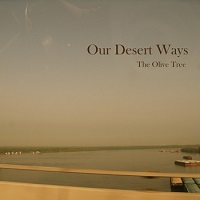 8. The Olive Tree, Our Desert Ways: It’s no secret I’m a fan of folk music, but Our Desert Ways is really the only folk album on this list (with the possible exception of Andrew Peterson, sure, maybe, whatever), and it’s about as simple as folk music comes. It’s basically two brothers, their acoustic guitars, and the occasional percussion. And that’s all you need for great music when you’re a great songwriter; Our Desert Ways makes the case that The Olive Tree has two great songwriters on their hands. My wife compared them to Caedmon’s Call, which she meant in a derogatory manner (she hates Caedmon’s Call, for some demonic reason…), though I’ll emphatically steal her comparison and use it for good. Caedmon’s Call has always had folk leanings, but their consistent quality is Gospel-centered lyrics buoyed by stable melodies, the perfect description for The Olive Tree as well. This can give CC and The Olive Tree a hokey feel sometimes, but Our Desert Ways’s commitment to storytelling and the Gospel have made this into a record that will endure.
8. The Olive Tree, Our Desert Ways: It’s no secret I’m a fan of folk music, but Our Desert Ways is really the only folk album on this list (with the possible exception of Andrew Peterson, sure, maybe, whatever), and it’s about as simple as folk music comes. It’s basically two brothers, their acoustic guitars, and the occasional percussion. And that’s all you need for great music when you’re a great songwriter; Our Desert Ways makes the case that The Olive Tree has two great songwriters on their hands. My wife compared them to Caedmon’s Call, which she meant in a derogatory manner (she hates Caedmon’s Call, for some demonic reason…), though I’ll emphatically steal her comparison and use it for good. Caedmon’s Call has always had folk leanings, but their consistent quality is Gospel-centered lyrics buoyed by stable melodies, the perfect description for The Olive Tree as well. This can give CC and The Olive Tree a hokey feel sometimes, but Our Desert Ways’s commitment to storytelling and the Gospel have made this into a record that will endure.
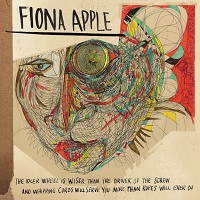 7. Fiona Apple, The Idler Wheel Is Wiser than the Driver of the Screw and Whipping Cords Will Serve You More than Ropes Will Ever Do: I can’t stand the stylings of metal or hardcore, and noise-rock tends to make me shudder, but I can’t get enough of the dissonance and strange chord changes of Fiona Apple. Even the most listenable songs on The Idler Wheel… (“Every Single Night”, “Anything We Want”) are minor in key and unapologetically complicated in their construction. They match their maker without a doubt; the most memorable lyric on the album, “nothin’ wrong when a song ends in the minor key” applies to both Apple’s music and, ostensibly, her life’s situations. She never sounds comfortable, but if she’s comfortable with anything, it’s the fact that she’s a screwed-up person and her life is equally as screwed up. On “Jonathan”, she begs to be kissed while her mind is racing. On “Left Alone”, she talks about her tears calcifying in her stomach, so that she can’t cry when she’s sad. And on the standout “Werewolf”, she claims complicity in the dissolution of a relationship, comparing her significant other to a shark and her faults to “waving around a bleeding open wound”. I hope this album provided her some catharsis, because the songs portray a person with complex issues that needed to be dealt with- in other words, a human being.
7. Fiona Apple, The Idler Wheel Is Wiser than the Driver of the Screw and Whipping Cords Will Serve You More than Ropes Will Ever Do: I can’t stand the stylings of metal or hardcore, and noise-rock tends to make me shudder, but I can’t get enough of the dissonance and strange chord changes of Fiona Apple. Even the most listenable songs on The Idler Wheel… (“Every Single Night”, “Anything We Want”) are minor in key and unapologetically complicated in their construction. They match their maker without a doubt; the most memorable lyric on the album, “nothin’ wrong when a song ends in the minor key” applies to both Apple’s music and, ostensibly, her life’s situations. She never sounds comfortable, but if she’s comfortable with anything, it’s the fact that she’s a screwed-up person and her life is equally as screwed up. On “Jonathan”, she begs to be kissed while her mind is racing. On “Left Alone”, she talks about her tears calcifying in her stomach, so that she can’t cry when she’s sad. And on the standout “Werewolf”, she claims complicity in the dissolution of a relationship, comparing her significant other to a shark and her faults to “waving around a bleeding open wound”. I hope this album provided her some catharsis, because the songs portray a person with complex issues that needed to be dealt with- in other words, a human being.
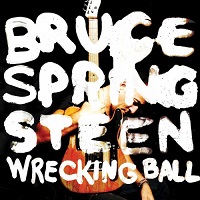 6. Bruce Springsteen, Wrecking Ball: I wonder if Bruce Springsteen is the kind of artist I’m supposed to grow out of: earnest dad rock made by a man whose biggest hits were before I was born. There’s no nostalgia holding me to Bruce, since I didn’t listen to him until college, and he’s hardly a defining artist of my generation. Regardless, I can’t let go; he keeps putting out albums, and I keep loving them. Wrecking Ball continues his trend of politically leaning albums mixing rock with folk begun in the 2000s with The Rising and continued with Magic and Working on a Dream. We all know where Springsteen falls on the political spectrum (if you don’t, search Google for “Bruce Springsteen” and “campaign song”), but what often gets lost is the universality of Bruce’s lyrics and music. If you remove Bruce the person from the songs, it’s hard to argue with words like “Let a man work, is that so wrong?” or “The road of good intentions has gone as dry as a bone”. On an album where Bruce Springsteen swerves into hip-hop for the first time, I resist the idea that I could ever grow out of Bruce Springteen. Instead, I’m seeing more and more than he’s one of the best artists of any time.
6. Bruce Springsteen, Wrecking Ball: I wonder if Bruce Springsteen is the kind of artist I’m supposed to grow out of: earnest dad rock made by a man whose biggest hits were before I was born. There’s no nostalgia holding me to Bruce, since I didn’t listen to him until college, and he’s hardly a defining artist of my generation. Regardless, I can’t let go; he keeps putting out albums, and I keep loving them. Wrecking Ball continues his trend of politically leaning albums mixing rock with folk begun in the 2000s with The Rising and continued with Magic and Working on a Dream. We all know where Springsteen falls on the political spectrum (if you don’t, search Google for “Bruce Springsteen” and “campaign song”), but what often gets lost is the universality of Bruce’s lyrics and music. If you remove Bruce the person from the songs, it’s hard to argue with words like “Let a man work, is that so wrong?” or “The road of good intentions has gone as dry as a bone”. On an album where Bruce Springsteen swerves into hip-hop for the first time, I resist the idea that I could ever grow out of Bruce Springteen. Instead, I’m seeing more and more than he’s one of the best artists of any time.
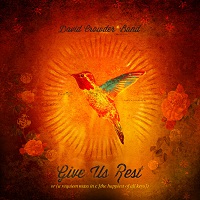 5. David Crowder*Band, Give Us Rest; or, A Requiem Mass in C (The Happiest of All Keys): You know, David Crowder*Band had nothing left to prove. They had already made at least three great records without releasing a bad one, on top of putting together a rollicking live show that mixed their standards with others’ worship songs and bluegrass hymns. When they announced they’d be releasing their last album and embarking on their final tour, their legacy was intact. They were the premier Christian pioneers of creative music-making, bringing innovation and excitement to a genre that was (and is) severely lacking in both. Give Us Rest didn’t have to be their best album ever, and on its release, a lot of critics dismissed it as too long, too indulgent, too boring. And they’re entitled to their opinions; they’re just wrong. Give Us Rest is a joyous eruption of desperate praise. It’s 100 minutes long, which is daunting at first, but there’s not a down spot on the album; even the instrumentals glow with vitality. I’m not sure that, if I step back and think on it, I would say Give Us Rest is David Crowder*Band’s best album. But while I listen to it, I certainly feel like it is.
5. David Crowder*Band, Give Us Rest; or, A Requiem Mass in C (The Happiest of All Keys): You know, David Crowder*Band had nothing left to prove. They had already made at least three great records without releasing a bad one, on top of putting together a rollicking live show that mixed their standards with others’ worship songs and bluegrass hymns. When they announced they’d be releasing their last album and embarking on their final tour, their legacy was intact. They were the premier Christian pioneers of creative music-making, bringing innovation and excitement to a genre that was (and is) severely lacking in both. Give Us Rest didn’t have to be their best album ever, and on its release, a lot of critics dismissed it as too long, too indulgent, too boring. And they’re entitled to their opinions; they’re just wrong. Give Us Rest is a joyous eruption of desperate praise. It’s 100 minutes long, which is daunting at first, but there’s not a down spot on the album; even the instrumentals glow with vitality. I’m not sure that, if I step back and think on it, I would say Give Us Rest is David Crowder*Band’s best album. But while I listen to it, I certainly feel like it is.
 4. Japandroids, Celebration Rock: There was a time in the distant, shrouded past when rock and roll was pure and unadulterated, forged in the fires of youthful passion and glorious naïveté, free from corporate greed and machinated studio contracts. And even though none of that is true, Japandroids will make you believe it is. Celebration Rock is exactly that: a celebration of the excesses of the music that is rock. The titles of the songs (“Fire’s Highway”, “Adrenaline Nightshift”, “Continuous Thunder”) gesture toward the great expectations Japandroids has for their music’s effectiveness. Japandroids is just two people, but they play with more force than most groups of any number, to the point where they’re in your heart before you even realize that everyone likes them so you’re not supposed to.
4. Japandroids, Celebration Rock: There was a time in the distant, shrouded past when rock and roll was pure and unadulterated, forged in the fires of youthful passion and glorious naïveté, free from corporate greed and machinated studio contracts. And even though none of that is true, Japandroids will make you believe it is. Celebration Rock is exactly that: a celebration of the excesses of the music that is rock. The titles of the songs (“Fire’s Highway”, “Adrenaline Nightshift”, “Continuous Thunder”) gesture toward the great expectations Japandroids has for their music’s effectiveness. Japandroids is just two people, but they play with more force than most groups of any number, to the point where they’re in your heart before you even realize that everyone likes them so you’re not supposed to.
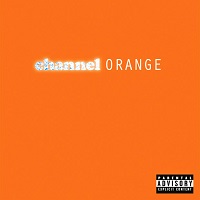 3. Frank Ocean, channel ORANGE: One of my friends has called Frank Ocean the “black Bon Iver”, which he meant as an insult, but it’s actually a pretty apt comparison. Both artists make supremely melancholy music that transcends whatever genre they get pigeonholed in; both artists have seen success in the mainstream but truly belong somewhere outside of the radio box; and both have unlikely partnerships with Kanye West that helped stretch his music beyond his soul-sampling comfort zone. But with all due respect to Bon Iver, Frank Ocean is the reigning king of disillusionment. The characters in his songs either live on the fringes of the world or they live the high life; there’s not really a middle ground for him (unless you count the average Joe in “Forrest Gump”, but he’s obsessed with the titular athlete, so he’ll end up on the fringes somehow, some way). But all the perspectives he adopts share a sense of melancholy that can’t be duplicated. The result is a boom in alt-R&B acts that are striving (some more successfully than others) to do just that; but channel ORANGE is that rare album that stands and will stand as a marker of its time, the first of its kind.
3. Frank Ocean, channel ORANGE: One of my friends has called Frank Ocean the “black Bon Iver”, which he meant as an insult, but it’s actually a pretty apt comparison. Both artists make supremely melancholy music that transcends whatever genre they get pigeonholed in; both artists have seen success in the mainstream but truly belong somewhere outside of the radio box; and both have unlikely partnerships with Kanye West that helped stretch his music beyond his soul-sampling comfort zone. But with all due respect to Bon Iver, Frank Ocean is the reigning king of disillusionment. The characters in his songs either live on the fringes of the world or they live the high life; there’s not really a middle ground for him (unless you count the average Joe in “Forrest Gump”, but he’s obsessed with the titular athlete, so he’ll end up on the fringes somehow, some way). But all the perspectives he adopts share a sense of melancholy that can’t be duplicated. The result is a boom in alt-R&B acts that are striving (some more successfully than others) to do just that; but channel ORANGE is that rare album that stands and will stand as a marker of its time, the first of its kind.
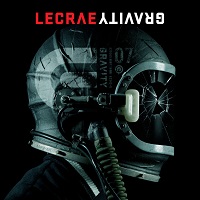 2. Lecrae, Gravity: A couple weeks ago, the rapper Evangel released a track online called “Hey Mr. Gravity” directed at Lecrae and the new direction he’s gone with his music. Evangel took it down soon after, acknowledging that releasing a song that came off as a diss track probably wasn’t the best way to call out a brother. It’s a shame, because Evangel’s song provided the perfect sounding board with which to test Lecrae’s methodology, so that we don’t just take Gravity at face value. I understand where Evangel was coming from- Lecrae is walking a fine line as he tries to rap from the perspective of those without Jesus, occasionally veering towards vilifying the church, God’s bride, and excusing sin. But it’s a line on which Lecrae ultimately comes down on the right side, pointing to Jesus’s power and not man’s as the solution to our ills. In fact, the more I listen to Gravity, the more I think Evangel must have forgotten to listen to it himself. This is Lecrae’s best record yet, and his first to sound like he doesn’t care if it has a hit or not. He moves away from the club-banger style that dominated Rehab and Overdose and branches out, embracing trap (“Lord Have Mercy”), Drake-style rap&B (“Confe$$ions”), and Afro-rap (“Violence”). But the majority of the disc features the southern rap style that is dominating Reach Records’ recent releases, and you hear it here at its rollicking best. Lecrae receives plenty of help from Trip Lee, Sho Baraka, Tedashii, Andy Mineo, and the rest of the usuals (along with a surprise appearance from Big K.R.I.T. on standout “Mayday”), but by the end of the record it’s clear that none of them are the star. Finishing the album with “Tell the World” and “Lucky Ones”, songs that drive home our need to tell others the Gospel, Lecrae places Gravity firmly in Christ’s hands where it belongs.
2. Lecrae, Gravity: A couple weeks ago, the rapper Evangel released a track online called “Hey Mr. Gravity” directed at Lecrae and the new direction he’s gone with his music. Evangel took it down soon after, acknowledging that releasing a song that came off as a diss track probably wasn’t the best way to call out a brother. It’s a shame, because Evangel’s song provided the perfect sounding board with which to test Lecrae’s methodology, so that we don’t just take Gravity at face value. I understand where Evangel was coming from- Lecrae is walking a fine line as he tries to rap from the perspective of those without Jesus, occasionally veering towards vilifying the church, God’s bride, and excusing sin. But it’s a line on which Lecrae ultimately comes down on the right side, pointing to Jesus’s power and not man’s as the solution to our ills. In fact, the more I listen to Gravity, the more I think Evangel must have forgotten to listen to it himself. This is Lecrae’s best record yet, and his first to sound like he doesn’t care if it has a hit or not. He moves away from the club-banger style that dominated Rehab and Overdose and branches out, embracing trap (“Lord Have Mercy”), Drake-style rap&B (“Confe$$ions”), and Afro-rap (“Violence”). But the majority of the disc features the southern rap style that is dominating Reach Records’ recent releases, and you hear it here at its rollicking best. Lecrae receives plenty of help from Trip Lee, Sho Baraka, Tedashii, Andy Mineo, and the rest of the usuals (along with a surprise appearance from Big K.R.I.T. on standout “Mayday”), but by the end of the record it’s clear that none of them are the star. Finishing the album with “Tell the World” and “Lucky Ones”, songs that drive home our need to tell others the Gospel, Lecrae places Gravity firmly in Christ’s hands where it belongs.
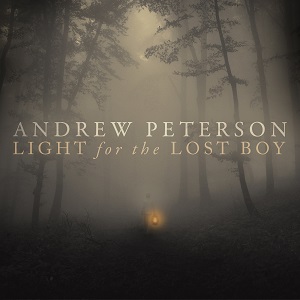 1. Andrew Peterson, Light for the Lost Boy: My wonderful wife bought us tickets to Andrew Peterson’s show in Linden, TX this weekend for my birthday. When I tell people this, it’s with a certain amount of childish excitement that must come across on my face or in my voice or something, because they ask in a frightened way, “Who is he?” I tell them he’s a Christian folk artist, and we all go on our merry way, but I fear I’m underselling him. Don’t get me wrong, there’s nothing wrong with Christian folk, and it’s a designation that certainly would have been true for his first seven or eight albums (give or take his classic Christmas album); but frankly, Light for the Lost Boy fails to qualify as folk. From his last album (the excellent Counting Stars) to Light, Andrew Peterson significantly expanded his palette. Much like 2011’s best album, Gungor’s Ghosts upon the Earth, Light for the Lost Boys doesn’t abandon what made its predecessor great; after all, there are still Americana stylings hanging around. But there’s so much more to enjoy, from the almost grunge guitars mixing with U2 reverb on “The Cornerstone” to the indie-pop of “The Voice of Jesus” and “Shine Your Light on Me” and on to the swirling, 10-minute epic “Don’t You Want to Think Someone”. Peterson’s sound is fuller on this album, more ambitious and more realized at the same time. This jump in musicality befits a similar jump in themes. Counting Stars was simpler, focused on family and devoted love. Light for the Lost Boy focuses on those as well, but adds the passage of time, purpose, the grandeur of God in nature, and theological quandaries to the mix. It’s both the biggest album on this list and the smallest, and it’s time you listened to it.
1. Andrew Peterson, Light for the Lost Boy: My wonderful wife bought us tickets to Andrew Peterson’s show in Linden, TX this weekend for my birthday. When I tell people this, it’s with a certain amount of childish excitement that must come across on my face or in my voice or something, because they ask in a frightened way, “Who is he?” I tell them he’s a Christian folk artist, and we all go on our merry way, but I fear I’m underselling him. Don’t get me wrong, there’s nothing wrong with Christian folk, and it’s a designation that certainly would have been true for his first seven or eight albums (give or take his classic Christmas album); but frankly, Light for the Lost Boy fails to qualify as folk. From his last album (the excellent Counting Stars) to Light, Andrew Peterson significantly expanded his palette. Much like 2011’s best album, Gungor’s Ghosts upon the Earth, Light for the Lost Boys doesn’t abandon what made its predecessor great; after all, there are still Americana stylings hanging around. But there’s so much more to enjoy, from the almost grunge guitars mixing with U2 reverb on “The Cornerstone” to the indie-pop of “The Voice of Jesus” and “Shine Your Light on Me” and on to the swirling, 10-minute epic “Don’t You Want to Think Someone”. Peterson’s sound is fuller on this album, more ambitious and more realized at the same time. This jump in musicality befits a similar jump in themes. Counting Stars was simpler, focused on family and devoted love. Light for the Lost Boy focuses on those as well, but adds the passage of time, purpose, the grandeur of God in nature, and theological quandaries to the mix. It’s both the biggest album on this list and the smallest, and it’s time you listened to it.
Fifteen More (in alphabetic order)
Alabama Shakes: Boys & Girls
Amadou & Mariam: Folila
Anaïs Mitchell: Young Man in America
Beautiful Eulogy: Satellite Kite
Carolina Chocolate Drops: Leaving Eden
Christopher Paul Stelling: Songs of Praise and Scorn
Flatfoot 56: Toil
Grizzly Bear: Shields
Jack White: Blunderbuss
John Fullbright: From the Ground Up
Matt Mays: Coyote
Passion Pit: Gossamer
Propaganda: Excellent
Trip Lee: The Good Life
The Vespers: The Fourth Wall
Top Albums of 2013 (So Far, in alphabetic order)
Jason Isbell, Southeastern: Probably my favorite album of the year (so far). Isbell has released other good records since leaving Drive-By Truckers, but Southeastern is by far his most personal and forceful as he chronicles his recovery from alcoholism.
Justin Timberlake, The 20/20 Experience: Corporate it may be, but there’s no denying that JT has once again made an album of songs that change our ideas of what pop should sound like today. This time he does so using funk and R&B sounds of the past.
KaiL Baxley, HeatStroke / The Wind and the War: This is the record that never fell on your radar this year. And if it weren’t for me, this diverse collection of funk and folk would have stayed off your grid. You’re welcome.
Laura Marling, Once I Was an Eagle: I’ve heard a lot of comparisons to past artists for Laura Marling (much like Jake Bugg), but they’re useless. Marling is a singular voice in a conformist world. Her spare arrangements and vocals beg for creative descriptions and not lazy comparisons.
Patty Griffin, American Kid: Time after time, Patty Griffin turns out great alternative country albums. Her newest is a tribute to her late father, and the intimacy is apparent in both the personal lyrics and the immediate music.
Most Anticipated Albums of 2013 (The Rest of the Year, in alphabetic order)
Drake, Nothing Was the Same: There aren’t many artists for whom I would willingly dive into depression and self-degradingly hedonistic behavior in order to hopefully better myself, but Drizzy is one of them.
Gungor, I Am Mountain: The title could either be awesome or laughable, I haven’t decided yet. But I know on which side of that line the actual music will fall. Their last album, Ghosts upon the Earth was my favorite album of 2011. Some dropoff would be expected, but Gungor has always been a unique and surprising band, so all bets are off.
Janelle Monáe, The Electric Lady: Her The ArchAndroid was one of the best albums of 2010, though it failed to catch on with the mainstream. I’m a little disconcerted that she’s trying to appeal more to that demographic with this album, but early singles “Dance Apocalyptic” and “Q.U.E.E.N.” don’t sound like anything on the radio, so good riddance to that idea!
Justin Timberlake, The 20/20 Experience Part 2: It’s hard to imagine this living up to the success of Part 1, and “Take Back the Night” isn’t necessarily a smash, but at this point, I’m not betting against JT.
M.I.A., Matangi: “Bad Girls” and “Come Walk with Me” are superb. Here’s to hoping for a massive improvement on her terrible 2010 LP /\/\ /\ Y /\.
Previous Top Albums
2011
Gungor: Ghosts upon the Earth
Adele: 21
Over the Rhine: The Long Surrender
Bon Iver: Bon Iver
The War on Drugs: Slave Ambient
Fleet Foxes: Helplessness Blues
Drake: Take Care
Raphael Saadiq: Stone Rollin’
Beyoncé: 4
Matt Papa: This Changes Everything
2010
Titus Andronicus: The Monitor
Andrew Peterson: Counting Stars
Kanye West: My Beautiful Dark Twisted Fantasy
Gungor: Beautiful Things
Arcade Fire: The Suburbs
Surfer Blood: Astro Coast
The Tallest Man on Earth: The Wild Hunt
Jars of Clay: The Shelter
Ben Rector: Into the Morning
Local Natives: Gorilla Manor
Very cool to see Jason Isbell on your list for 2013. It’s a great album that might not get the attention it deserves because of its country leaning.
You need to give John Legend’s “Love In the Future” a listen. I guarantee it’ll find it’s spot somewhere on this blog within the first 8 songs. Hahaha.
we’ll see about that!